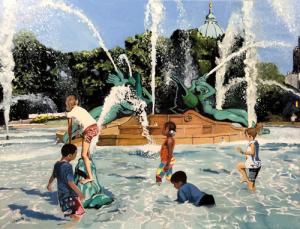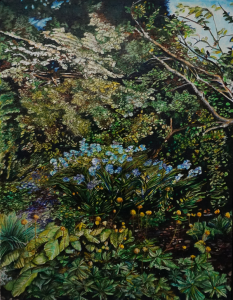
My stepson is reading Romeo and Juliet for his eighth grade English class. I asked him what he thought about it the other day during dinner.
He shrugged and tucked a forkful of mashed potatoes into his mouth.
“I don’t want to ruin it for you,” I warned. “But it doesn’t end well.”
“I know,” he responded.
I told him that when I was in eighth grade, I memorized the entire balcony scene from the play. I didn’t tell him that I had done it because I prayed that someday soon, Jim Hurst of the swim team and I may have a similar exchange. Never mind that I lived in single level house in Florida, and the only impediment to our romance was my Coke-bottle eye glasses and his total lack of interest. I pictured a balcony at the Don Caesar, myself in an eyelet dress with sassafras wound in my feathered hair. Him, standing below, possibly in just swim trunks, would call up to me in a deep voice with only a hint of crack, saying: “I take thee at thy word. Call me but love, and I’ll be new baptis’d; henceforth I never will be Romeo/Jim.” Somehow, it would work out sans the dual suicide and despite the chasmic-sized popularity differences.
It did not. Wherefore art thou, Jim? (Actually, Facebook tells me that he’s a pro golfer living in St. Pete with twin daughters and a wife named Bethany Anne.)
But these early ideas of romance and storytelling stayed with me as a writer throughout my teen years as I struggled to come up with love stories that illustrated that same longing and defiance that captivated me at age thirteen. I’d write heroes with barrel-chests and tousled golden curls, heroines with eyes that were always a weird color—grey like slate, churning sea green (?), lavender. They were loosely based on a mixture of Shakespeare, the movie Blue Lagoon, and romance novels I stole from my aunt JoAnne. Inevitably, the women wore bodices and the men had ripped blouse-like shirts. I cared mostly about the exteriors, the long descriptions of the way waist-length hair rippled in the summer breeze or the man’s white teeth gnashed with desire, much like a stallion’s, the “maiden blush” bepainting a cheek.
I’d come up with these scenes and show them to my mom, an avid reader, who would concentrate on the lined notebook pages and hand them back with vaguely encouraging words to keep at it.
I knew what I was writing was phony, stolen. Until I was a junior in high school, I hadn’t been kissed. I hadn’t even been in danger of being kissed. There had never even been hand-holding. The closest I had come was a note from Steve Crossett, one year older and a red-head, who’d written that he thought I was “a pretty decent person.” Pin that one up on your bulletin board next to a photo of Christopher Reeves as Superman ripped out of Seventeen.
I asked my mom for advice. How did she think I should write love scenes? She paused, considering. I could see that she was weighing her options. “Write it like it really is,” she said finally. What did she mean? She thought for a minute. She knew that I spent an inordinate amount of time in the library, and very little time with the opposite sex. Unless you counted Wednesday night bell choir practice. “I mean, write about leaning into kiss someone and you miss. Or your elbow going numb on the table while you’re waiting for your date to finish his boring story. Write about what it’s really like, not what you think it should be like.”
This is possibly the best writing advice I’ve ever received, along the lines of well-worn maxim to write what you know. I had thought that writing was all about imagining yourself into the world you wanted to inhabit. It is that. But it’s also about being able to see that situation as it truly is for your character—to picture all of its complexities and discomforts— the alive parts and the numb parts, the perfect moment and the awkward one. My love stories have mostly been awkward ones. Awkward, funny, lovely, horrible, and true. That’s the writing world I inhabit, and though I still love the tumbling poetry of Shakespeare, I stick to what feels most true to my experience.
